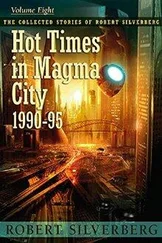Robert Silverberg - How it Was When the Past Went Away
Здесь есть возможность читать онлайн «Robert Silverberg - How it Was When the Past Went Away» весь текст электронной книги совершенно бесплатно (целиком полную версию без сокращений). В некоторых случаях можно слушать аудио, скачать через торрент в формате fb2 и присутствует краткое содержание. Год выпуска: 2007, ISBN: 2007, Издательство: Subterranean Press, Жанр: Фантастика и фэнтези, на английском языке. Описание произведения, (предисловие) а так же отзывы посетителей доступны на портале библиотеки ЛибКат.
- Название:How it Was When the Past Went Away
- Автор:
- Издательство:Subterranean Press
- Жанр:
- Год:2007
- ISBN:978-1-59606-089-0
- Рейтинг книги:4 / 5. Голосов: 1
-
Избранное:Добавить в избранное
- Отзывы:
-
Ваша оценка:
- 80
- 1
- 2
- 3
- 4
- 5
How it Was When the Past Went Away: краткое содержание, описание и аннотация
Предлагаем к чтению аннотацию, описание, краткое содержание или предисловие (зависит от того, что написал сам автор книги «How it Was When the Past Went Away»). Если вы не нашли необходимую информацию о книге — напишите в комментариях, мы постараемся отыскать её.
How it Was When the Past Went Away — читать онлайн бесплатно полную книгу (весь текст) целиком
Ниже представлен текст книги, разбитый по страницам. Система сохранения места последней прочитанной страницы, позволяет с удобством читать онлайн бесплатно книгу «How it Was When the Past Went Away», без необходимости каждый раз заново искать на чём Вы остановились. Поставьте закладку, и сможете в любой момент перейти на страницу, на которой закончили чтение.
Интервал:
Закладка:
“Dr. Bryce requests me to remind you that anyone still suffering severe impairment of memory—especially those experiencing loss of identity, confusion of vital functions, or other disability—should report to the emergency ward at Fletcher Memorial Hospital. Treatment is available there, and computer analysis is at the service of those unable to find their homes and loved ones. I repeat—”
Tim Bryce wished that the good commander hadn’t slipped in that plug for the real fiber of the American spirit, especially in view of the necessity to invite the remaining victims to the hospital with his next words. But it would be uncharitable to object. The old spaceman had done a beautiful job all weekend as the Voice of the Crisis, and some patriotic embellishments now were harmless.
The crisis, of course, was nowhere near as close to being over as Commander Braskett’s speech had suggested, but public confidence had to be buoyed.
Bryce had the latest figures. Suicides now totaled nine hundred since the start of trouble on Wednesday; Sunday had been an unexpectedly bad day. At least forty thousand people were still unaccounted for, although they were tracing one thousand an hour and getting them back to their families or else into an intensive-care section. Probably seven hundred and fifty thousand more continued to have memory difficulties. Most children had fully recovered, and many of the women were mending; but older people, and men in general, had experienced scarcely any memory recapture. Even those who were nearly healed had no recall of events of Tuesday and Wednesday, and probably never would; for large numbers of people, though, big blocks of the past would have to be learned from outside, like history lessons.
Lisa was teaching him their marriage that way.
The trips they had taken—the good times, the bad—the parties, the friends, the shared dreams—she described everything as vividly as she could, and he fastened on each anecdote, trying to make it a part of himself again. He knew it was hopeless, really. He’d know the outlines, never the substance. Yet it was probably the best he could hope for.
He was so horribly tired, suddenly.
He said to Kamakura, “Is there anything new from the park yet? That rumor that Haldersen’s actually got a supply of the drug?”
“Seems to be true, Tim. The word is that he and his friends caught the character who spiked the water supply, and relieved him of a roomful of various amnesifacients.”
“We’ve got to seize them,” Bryce said.
Kamakura shook his head. “Not just yet. Police are afraid of any actions in the park. They say it’s a volatile situation.”
“But if those drugs are loose—”
“Let me worry about it, Tim. Look, why don’t you and Lisa go home for a while? You’ve been here without a break since Thursday.”
“So have—”
“No. Everybody else has had a breather. Go on, now. We’re over the worst. Relax, get some real sleep, make some love. Get to know that gorgeous wife of yours again a little.”
Bryce reddened. “I’d rather stay here until I feel I can afford to leave.”
Scowling, Kamakura walked away from him to confer with Commander Braskett. Bryce scanned the screens, trying to figure out what was going on in the park. A moment later, Braskett walked over to him.
“Dr. Bryce?”
“What?”
“You’re relieved of duty until sundown Tuesday.”
“Wait a second—”
“That’s an order, doctor. I’m chairman of the committee of public safety, and I’m telling you to get yourself out of this hospital. You aren’t going to disobey an order, are you?”
“Listen, commander—”
“Out. No mutiny, Bryce. Out! Orders.”
Bryce tried to protest, but he was too weary to put up much of a fight. By noon, he was on his way home, soupy-headed with fatigue. Lisa drove. He sat quite still, struggling to remember details of their marriage. Nothing came.
She put him to bed. He wasn’t sure how long he slept; but then he felt her against him; warm, satin-smooth.
“Hello,” she said. “Remember me?”
“Yes,” he lied gratefully. “Oh, yes, yes, yes!”
Working right through the night, Mueller finished his armature by dawn on Monday. He slept awhile, and in early afternoon began to paint the inner strips of loudspeakers on: a thousand speakers to the inch, no more than a few molecules thick, from which the sounds of his sculpture would issue in resonant fullness. When that was done, he paused to contemplate the needs of his sculpture’s super-structure, and by seven that night was ready to move to the next phase. The demons of creativity possessed him; he saw no reason to eat and scarcely any to sleep.
At eight, just as he was getting up momentum for the long night’s work, he heard a knock at the door. Carole’s signal. He had disconnected the doorbell, and robots didn’t have the sense to knock. Uneasily, he went to the door. She was there.
“So?” he said.
“So I came back. So it starts all over.”
“What’s going on?”
“Can I come in?” she asked.
“I suppose. I’m working, but come in.”
She said, “I talked it over with Pete. We both decided I ought to go back to you.”
“You aren’t much for consistency, are you?”
“I have to take things as they happen. When I lost my memory, I came to you. When I remembered things again, I felt I ought leave. I didn’t want to leave. I felt I ought to leave. There’s a difference.”
“Really,” he said.
“Really. I went to Pete, but I didn’t want to be with him. I want to be here.”
“I hit you and made your lip bleed. I threw the Ming vase at you.”
“It wasn’t Ming, it was K’ang-hsi.”
“Pardon me. My memory still isn’t so good. Anyway, I did terrible things to you, and you hated me enough to want a divorce. So why come back?”
“You were right, yesterday. You aren’t the man I came to hate. You’re the old Paul.”
“And if my memory of the past nine months returns?”
“Even so,” she said. “People change. You’ve been through hell and come out the other side. You’re working again. You aren’t sullen and nasty and confused. We’ll go to Caracas, or wherever you want, and you’ll do your work and pay your debts, just as you said yesterday.”
“And Pete?”
“He’ll arrange an annulment. He’s being swell about it.”
“Good old Pete,” Mueller said. He shook his head. “How long will this neat happy ending last, Carole? If you think there’s a chance you’ll be bouncing back in the other direction by Wednesday, say so now. I’d rather not get involved again, in that case.”
“No chance. None.”
“Unless I throw the Chi’ien-lung vase at you.”
“K’ang-hsi,” she said.
“Yes. K’ang-hsi.” He managed to grin. Suddenly he felt the accumulated fatigue of these days register all at once. “I’ve been working too hard,” he said. “An orgy of creativity to make up for lost time. Let’s go for a walk.”
“Fine,” she said.
They went out, just as a dunning robot was arriving. “Top of the evening to you, sir,” Mueller said.
“Mr. Mueller, I represent the accounts receivable department of Acme Brass and—”
“See my attorney,” he said.
Fog was rolling in off the sea now. There were no stars. The downtown lights were invisible. He and Carole walked west, toward the park. He felt strangely light-headed, not entirely from lack of sleep. Reality and dream had merged; these were unusual days. They entered the park from the Panhandle and strolled toward the museum area, arm in arm, saying nothing much to one another. As they passed the conservatory Mueller became aware of a crowd up ahead, thousands of people staring in the direction of the music shell. “What do you think is going on?” Carole asked. Mueller shrugged. They edged through the crowd.
Читать дальшеИнтервал:
Закладка:
Похожие книги на «How it Was When the Past Went Away»
Представляем Вашему вниманию похожие книги на «How it Was When the Past Went Away» списком для выбора. Мы отобрали схожую по названию и смыслу литературу в надежде предоставить читателям больше вариантов отыскать новые, интересные, ещё непрочитанные произведения.
Обсуждение, отзывы о книге «How it Was When the Past Went Away» и просто собственные мнения читателей. Оставьте ваши комментарии, напишите, что Вы думаете о произведении, его смысле или главных героях. Укажите что конкретно понравилось, а что нет, и почему Вы так считаете.












